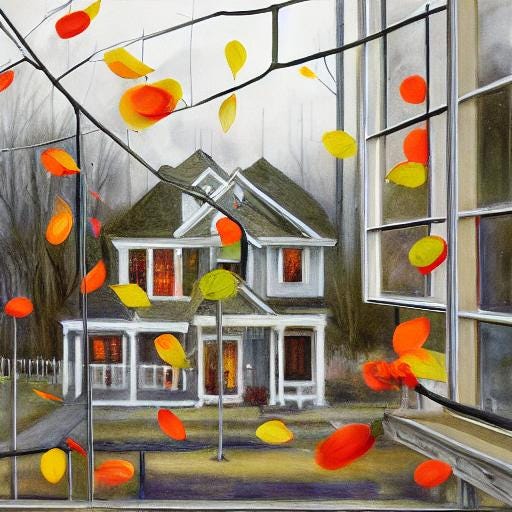Readers unfamiliar with "Quiet House" by Norman Prentiss may prefer to read these notes only after reading the story.
"Quiet House" by Norman Prentiss is funny the way Evelyn Waugh's short stories "Mr. Loveday's Little Outing" and "The Man Who Loved Dickens" are funny: outrageously and black-heartedly. Put it another way: it's Americana meets Saki's The Chronicles of Clovis.
Seventh grader Jeremy is about to trick-or-treat for the first time free of his mother's ridiculous rules. His first neighborhood stop will be the Myrick House.
His older step brother Sammy paints him a mouth-watering picture of the glories that await:
….You think the outside decorations are cool, but that’s nothing. You have no idea what it’s like inside, the way they fix up the whole first floor, kitchen and dining room and living room together converted into a real haunted house. They must spend a fortune: fog machine, spiderwebs, manacles bolted to a dungeon wall, a panel that slides open and a monster reaches out when you walk past. It’s like being on a movie set. There’s this cool trick with a mirror where you stare at your own face, but then there’s a purple glow and it’s like you’re transformed into an old man and then a demon. They had the same gag last year, but I still can’t figure out how it works. Then the floor moves, or the mirror does—it’s hard to tell which—and you stumble into the next set up, a new one this year, like a crypt. There’s this closed coffin and you hear knocking and scratching from inside, and I swear it feels like there’s someone in there, then some moans, then a faint whisper, Let me out, then another moan, and you know it’s a gag but can’t help walking closer in case somebody really is trapped in there. Your hand reaches forward, your foot creaks against a floorboard, and then holy crap the lid flies open with a hiss of compressed air, lights strobe, and a corpse sits up, grinning through a mess of rotted teeth, skin falling off its face as it shakes, and its arm lifts slow, fingertips bloody where the nails snapped off from scratching. Let me out crackles over those rotten teeth, and then the strobe snaps off and the lid shuts, ready for the next guy to step on the floorboard to activate the trick again. It was awesome. I don’t know how the Myrick’s will top that one next year, Germy, but I’m sure they will. They always do.”
But tragedy strikes. On October 29 the Myricks take down all their decorations. Apparently, a cousin’s adult daughter has met a grisly end, and the family is in mourning. No trick-or-treat.
Jeremy fumes. He slips out of the house the night of October 30.
He turned back toward the Myrick house. The shapes in black cloth continued to flicker across the front windows, and their rhythm seemed predictable. It occurred to him that maybe the people inside were dancing.
He listened for the beat of a drum, for a soft series of notes tapped on piano keys.
Nothing.
Then a laugh like a clear bell rang out against the night’s silence.
He’d barely spoken to Elizabeth Myrick over the years, but Jeremy was convinced the laugh belonged to her.
More laughter, a chorus this time, muffled by the closed windows. Someone had told a joke.
Maybe the joke was about a boy. A boy who loved Halloween and looked forward every year to the town’s famously decorated house, yet never got to go inside. Isn’t that funny?
This was not a house of mourning.
They were laughing at him.
He recalled his stepbrother’s stories about families who practically invited a Halloween prank—the Singletons hoarding candy for themselves and hiding in their dark house while Sammy heaved part of their fence onto the roof. Served them right.
You’re just a baby. You have to be brave, to pull the kind of tricks we do.
Sure, maybe somebody in the Myrick family had died, a distant relative, but it sounded like they’d gotten over her death pretty quickly. There was no reason for them to take down the decorations, to cancel their traditional haunted house display.
Quiet zone? He’d show them a bit of noise. Before the night was over, Jeremy would have his own trick or treat story to tell his stepbrother.
He went back to the boulder, kneeled and felt carefully for the chipped rocks at its base. His hand closed around one the size of a softball. He lifted it, tested the weight. It was heavy, but not too heavy to throw.
And he was running toward the house, dodging between the bumpers of parked cars, the rock a dead weight at the end of his arm as he raced up the lawn and toward a front window. He was silent, a wind of retribution, but he screamed in his head as he raised the rock behind his ear, arced his shoulder back on that side, still running, tensing the muscles of his arm, then launching it forward, his whole body behind the throw, fingers opening and the rock flying forward towards a top panel of the window.
What mischievous child wouldn’t find some enjoyment in the sound of breaking glass? The rock smashed through with startling and satisfying force, and glass shards tumbled forward in a sharp sequence of high-pitched notes.
He’d brought music to their party.
Take that for ruining Halloween, he thought. A spiteful idea came to him that maybe he should have tied a note to the rock beforehand, some cruel threat misspelled in terrifying, shaky letters: YOUR NEXT, or GRETINGS FROM HELL. That would have been cool.
He backed up, ready to run like the way Sammy and his friends bolted from a house after a Halloween prank. But he paused, a scant ten feet from the shattered window, and hid in the shadow of a tree. He wanted to hear some reaction from inside. A gasp or curse word or cry of surprise.
The house was quiet.
What had he heard before? The window bursting inward, the melodic rain of glass. Something else, too. A thud like a dead weight dropped into sand, and the crackle of dried leaves crushed underfoot. Then this long silence, as if the house were holding its breath—
“Oh my God!”
A woman’s voice, weak and raspy yet rising in surprise and horror, growing loud and cracking in the shrill, final syllable. Like the cry of a tortured animal, or of a person going insane.
It was the most anguished sound he had ever heard.
Then other cries, too, a whole room full of people wailing in agony.
But he hadn’t done anything, not really. He’d only thrown a rock. The way they cried out, you’d think Jeremy had killed someone.
That wasn’t possible. Was it?
At this point, we are only halfway in "Quiet House."
The macabre punchline soon begins gathering force.
With "Quiet House" Norman Prentiss has created a holiday classic: a Norman Rockwell worthy to hang in "Rod Serling's Night Gallery."
Jay




